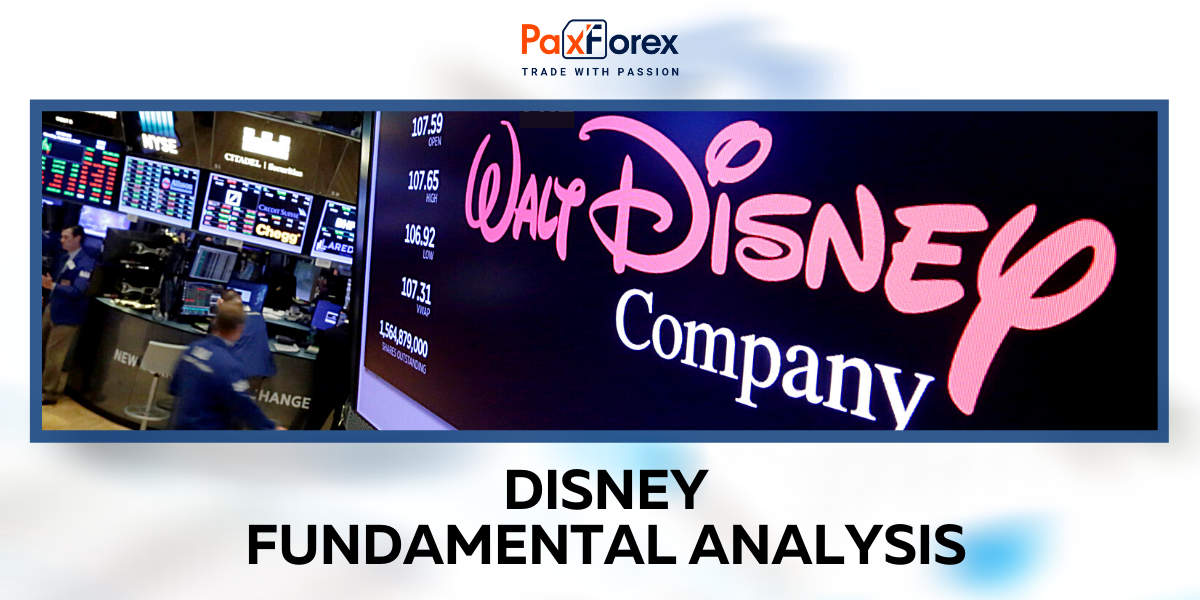
Source: PaxForex Premium Analytics Portal, Fundamental Insight
As we know, the Walt Disney Company is known throughout the world for its ability to give fabulous experiences to customers, which is not the case for investors. Of course, we are talking about this year, 2022.
The entertainment giant's stock price fell 39% year over year as growth in its streaming business slowed, losses enlarged, and investors fail to believe in the company's roadmap and perspectives. These problems culminated just a couple of weeks ago when the board kicked out CEO Bob Chapek and returned Bob Iger, who led Disney from 2005 to 2020, to run the company.
Investors welcomed the move, but investors should consider a number of other factors to bet on Disney's return next year. Let's take a look at the main ones.
- The streaming business reaches its turning point
Disney's streaming segment posted a $4 billion loss in the recently ended fiscal year, but management has good news for investors. The company now believes that losses in the streaming division will start to decline and Disney+ to reach profitability by 2024.
In December, the company will launch an advertising tier for Disney+ and raise prices on its streaming service. Instead of offering a tier with ads at a lower price, as is typically the case with the two-tier model, Disney is raising the price for a tier without ads from $7.99/month to $10.99/month and charging $7.99/month for a tier with ads. This means the company will make more money from subscribers, whether they choose to subscribe without ads or opt for ads. Disney is using a similar pricing strategy for its streaming package, which includes Hulu and ESPN+.
Management has also said it expects to cut marketing spending on streaming to help enhance the bottom line.
- The stock seems undervalued
Disney's strengths are obvious. For generations, the company has been a leading brand in family entertainment. It owns popular theme parks around the world, and its flywheel business model improves profits from its vast collection of intellectual property that serves as content for movie theaters and streaming, themed rides and attractions in its parks, and consumer products such as toys.
No other company can match Disney in the variety of characters, from classic Disney princesses to superheroes, and it doesn't have the variety of assets to make the most of them.
However, the stock does not look good because the company is in the process of transitioning from linear television to streaming television, which is affecting its profits. That means the stock doesn't necessarily look undervalued at a price-to-earnings ratio of 26.6.
Disney's parks, entertainment, and products division generated $8 billion in operating income in 2021, though historically that business has been less profitable than the media and entertainment division. If the company can get the media business back on track by controlling the slowdown in linear networks and bettering the bottom line in streaming, the stock is likely to respond, particularly if Iger can convince the market again of the growth story.
- Chapek's ineffective reign has become obvious
Now that Iger is back in the executive chair, it has become obvious that the company has been mismanaged under Chapek. He estranged creative executives by changing the priority of streaming, and many of them complained to the board. Even CFO Christine McCarthy, unusually, expressed her distrust of Chapek to the board after the company's November earnings report. Chapek and Iger, who had served as chairman of the board since leaving as CEO, also feuded. Chapek was criticized for failing to respond to Florida's "Don't Say Gay" law and raising prices too aggressively at the theme parks, frustrating customers.
There is no guarantee that Iger will magically deal with all of the company's problems overnight, but he has the advantage of already being respected by top Disney and Wall Street executives. He is best known for making a number of lucrative acquisitions during his tenure, including Pixar, Marvel, Lucasfilm, and Fox entertainment assets, which has given Disney a wealth of new intellectual property to use in movies, shows, and attractions.
Iger has already set to work to get Disney back on the right track, firing Chapek's top assistants, promising a restructuring that would put storytelling at the center of the company, and indicating that layoffs are likely to come.
Given that morale at the company is back on the upswing, the momentum from streaming ads, and the right change in strategy, Disney stock should have no trouble recouping at least some of its recent losses.
After all, it is one of the world's leading consumer brands and a company with a host of competitive advantages. If managed correctly, the entertainment company's stock should reward investors in 2023 and beyond.
As long as the price is below 100.00, follow the recommendations below:
- Time frame: D1
- Recommendation: short position
- Entry point: 92.46
- Take Profit 1: 87.00
- Take Profit 2: 80.00
Alternative scenario:
If the 100.00 level is broken-out, follow the recommendations below:
- Time frame: D1
- Recommendation: long position
- Entry point: 100.00
- Take Profit 1: 108.00
- Take Profit 2: 117.00













